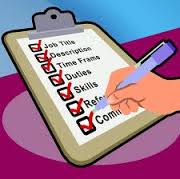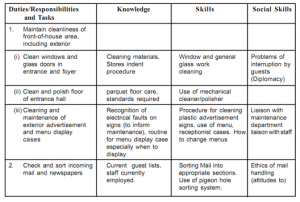Well, that got me into conversation with a few people about the logistics of how you actually HIRE the right person to come and work with you. It’s true that if you’ve never hired someone before the only thing you potentially have to go on, is your own experience of a job interview and that may not have been any good. Not everyone has HR experience, and certainly SME business owners may not have needed HR in the past, so let’s take a long hard look at how to hire your first employee.
First things first
Decide how many hours you want your employee to work and how many weeks – this serves as the contract of hours.
Then you really need to get to grips with what it is you want your first employee (or subsequent employees) to do.
Draw up a Job SpecA job spec – or a job specification – is not as onerous as it sounds. Take a sheet of A4 and divide it up into three columns. In Column A write “What the job entails”, in Column B write “Skills needed” and in Column C write “What to find out”.
If you want the person who comes to work for you to sell your products for example, then top of the job spec in Column A will be ‘Sell products’. But you don’t just want anybody, do you? You want someone who will be good at what they do. You may think, “Well, I’m only paying minimum national wage” but believe me you can still hire good and motivated staff who will care about what they are doing and make a difference to your business. So in Column B next to ‘Sell Products’ in Column A list a number of skills that you would like the ideal candidate to have that relate to selling products. You could write experienced for example, and friendly, gift of the gab, good with money , or knowledgeable about the types of product you sell and so on.
If you need someone who should be able to unpack stock and count the stock you have, under skills in Column B you might write physically fit, and numerate.
If it is important that the person you hire is always on time and ready to go, write reliable in Column B and so on.
Put this job spec aside for one moment – it’s time to advertise your job.
Advertise for your first employeeThere are a number of ways you can find the right first employee. If you have premises – and even if you have a market stall you can simply put as sign up saying ‘Help required, apply here’ or something along those lines. That way you’ll get walk-ups from people who at least know what you sell and where you’re located.
The only drawback with this is that if you’re a bit nice – a bit spongelike – you may find it difficult to say No to the first one that comes along, and you may end up with someone unsuitable in the long run, or someone who promises the earth and delivers headaches on toast.
You can advertise in the newspapers. Your local paper will have a jobs section at least once a week so you can easily place an advert. There will probably be a small cost and you may have to check the copy and spelling yourself – but there will be a phoneline if you need assistance.
You can place an advert with the local Job Centre. This has a number of advantages. It’s free for starters. You can do it all by phone. They have their own generic application forms if need be and the staff are usually very helpful and experienced.Don’t fear that the Job Centre is home to the unemployable. Many people looking to change jobs use Job Centres also – and you’ll be surprised how many people suddenly find themselves out of work and in need of gainful employment. A decent job will warm the cockles of their heart.
Whichever method you choose you will need to give applicants an outline of what is required in the job, the sort of skills they will need and how many hours will be involved. But this isn’t a problem is it, because you’ve already listed all of that above in your job spec 😉
State when the cut-off date is for applications is, and don’t be tempted to hire your first employee until that date has passed.
Back to our Job Spec
Now in Column C, next to the list of all the attributes in Column B that you require from your new employee, you need to think about how you are going to find out whether applicants for your job can do all of these things or not.
Next to ‘Sell Products’ you might write – ‘previous retail experience or similar?’
Next to ‘friendly’ in Column B you might write – ‘see at interview’
Next to numerate you might write ‘GCSE grade’?
What you’re looking to do is find a way of proving that the applicant has the skills you need. Do you see what I mean?
You can do this in a number of ways.
1. If you’re getting walk ups to your stall, or walk-ins to your shop you can ask them there and then. It strikes me that if you want casual staff and you’re not overly bothered then this is an OK approach.
2. You can ask for CVs. The disadvantage of CVs is that they may be extremely generic – meaning they will list where the applicant has worked and their exam grades but they don’t really tell you what skills the applicant has or what sort of person they are. How does your candidate achieving a C in RE help you as an employer? It may be that this applicant was great at discussion in class and gave great presentations and so they will be brilliant when working with the public – but as it doesn’t say that on the CV you don’t know, do you? A good CV should be tailored to the job in question detailing the type of skills the applicant has that are – in this case – needed in the retail job you are offering. But for National Minimum Wage this may be a little too much to expect.3. Apply in writing. Now this sounds really old fashioned I appreciate (and it doesn’t need to be an application that is actually handwritten – a word processed application is much more professional) but it has certain advantages. If you specifically ask for the following “Please apply in writing stating why you feel this is the job for you” or something along those lines, you’ll quickly be able to weed out the chancers from the potential first employees because the good applicants will tell you that they can do your job because they have these skills (A, B and C) and this experience (D, E and F).
4. Even better say “Please apply in writing stating why you feel this is the job for you and enclose your CV”. What you then have are good applications discussing the skills an applicant has, and CVs with details of qualifications and experience. Bonanza!
ShortlistingOnce you have your applications in you can have a good sift through. See if there are 3 to 5 that really stand out. You can say thanks but no thanks to the others. These days many employers say in their job advert “If you have not heard by such and such a date assume you have not been selected this time” or something similar. But it is still nice for an applicant to get a letter thanking them for the trouble they took to apply and their interest in your business if you can manage that. Make sure to find a reliable online background check service and vet every one of your potential employees – missing someone with a criminal record could open you up to a slew of lawsuits from your current workers, if you have any, or prevent you from being able to hire the ones you want later.
Contact the lucky ones and set up an interview. You can do this at your place of employment or take them to a local coffee bar and interview them there in relaxed surroundings. Have your (by now battered) job spec sheet with you and go over those salient points once again. Coax the applicant to give more detail about their experiences and skills.
Try to find out what makes them passionate and what makes them annoyed. Give them a ‘worst case scenario’ of a bad customer and see what they would do in those circumstances. Make sure that if you’re looking for a customer friendly person your applicant is smiley, relaxed, confident and capable of cracking a joke and laughing. This will give your customers a better experience and you too – because you’re going to be working with this – your first employee – after all.Allow the applicant to ask you questions too. This will help to demonstrate how interested and knowledgeable about your job they are.
End every interview by reiterating what the hours and conditions of employment are and asking whether the applicant is still interested.
Offering the job
After the interview sit and think about the different candidates. Weigh up their pros and cons and consider how convinced you are by their performance. Your head should rule your heart here – but it’s entirely up to you. You’re the boss.
It is fine to then contact the successful applicant by phone and offer the job. You should then contact the unsuccessful applicants and let them down gently. Only do this AFTER the successful applicant has accepted the job. To the unlucky applicants, say that it was a close call and you really appreciate the time and effort they have taken and wish them luck for the future.And that’s it! You have your first employee! How does that feel? Is this useful information? What else would you advise owners of SME when they start to take on staff? What was your first experience of taking on an employee like? Do you have any more tips? Leave a comment below or join us on Facebook for a natter 🙂
 Wholesale
Wholesale 







One Response to “Hiring! Taking on your first employee (HR for beginners)”
This post was very informative. I have worked in a lot of job agencies Manchester based and these guidelines have never been taught to me before. As a recruiter, I only focus on matching the applicant with the right job. I never thought that there’s a better way to process applications. I agree that a lot of recruiters use their own experience as basis for their strategy. This post will definitely change the way we do our recruitment process.